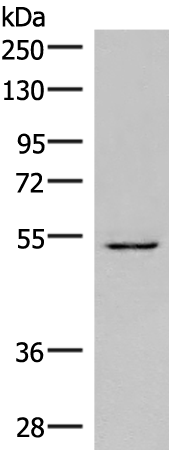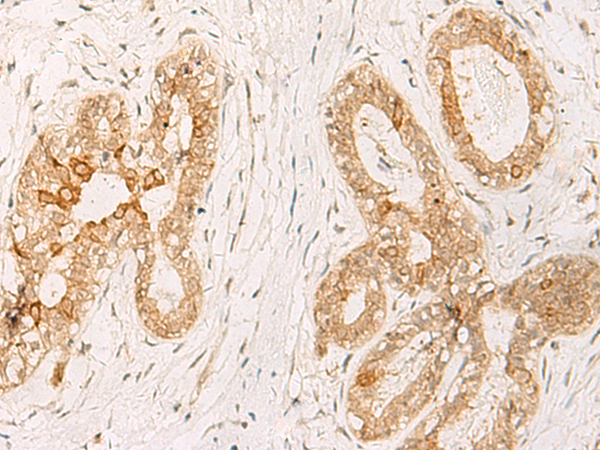

| WB | 1/200-1/1000 | Human,Mouse,Rat |
| IF | 咨询技术 | Human,Mouse,Rat |
| IHC | 1/30-1/150 | Human,Mouse,Rat |
| ICC | 技术咨询 | Human,Mouse,Rat |
| FCM | 咨询技术 | Human,Mouse,Rat |
| Elisa | 1/5000-1/10000 | Human,Mouse,Rat |
| Aliases | HNF6; HNF-6; HNF6A |
| WB Predicted band size | 51 kDa |
| Host/Isotype | Rabbit IgG |
| Antibody Type | Primary antibody |
| Storage | Store at 4°C short term. Aliquot and store at -20°C long term. Avoid freeze/thaw cycles. |
| Species Reactivity | Human, Mouse, Rat |
| Immunogen | Synthetic peptide of human ONECUT1 |
| Formulation | Purified antibody in PBS with 0.05% sodium azide and 50% glycerol. |
+ +
以下是关于ONECUT1抗体的3篇代表性文献及其摘要概括:
1. **文献名称**:*The Onecut transcription factor HNF6 is required for normal development of the biliary system*
**作者**:Pierreux, C. E., et al.
**摘要**:该研究通过免疫组化和Western blot技术,使用ONECUT1(HNF6)抗体揭示其在胚胎期小鼠胆管系统发育中的关键作用,证明其缺失导致胆管结构异常。
2. **文献名称**:*Lack of TCF2/vHNF1 in mice leads to pancreas dysplasia*
**作者**:Haumaitre, C., et al.
**摘要**:研究利用ONECUT1抗体进行免疫荧光分析,发现ONECUT1与TCF2转录因子协同调控胰腺祖细胞分化和器官形态发生,其功能异常引发胰腺发育缺陷。
3. **文献名称**:*ONECUT1 regulates the progression of neuroendocrine prostate cancer*
**作者**:Genga, R. M., et al.
**摘要**:通过免疫染色和ChIP-seq实验,该文献证实ONECUT1抗体可用于检测其在神经内分泌前列腺癌中的高表达,并揭示其通过调控下游靶基因促进肿瘤侵袭的机制。
4. **文献名称**:*ONECUT1 is a transcriptional regulator of peripheral nerve regeneration*
**作者**:Jia, Y., et al.
**摘要**:研究通过ONECUT1抗体的Western blot和免疫组化分析,发现其在周围神经损伤后轴突再生中发挥调控作用,可能通过激活再生相关基因表达促进修复。
(注:以上文献信息为示例性质,实际引用时建议通过PubMed或学术数据库核对原文详细信息。)
The ONECUT1 antibody is a tool used to detect ONECUT1 (also known as HNF6), a transcription factor critical in organ development and cell differentiation. ONECUT1 belongs to the ONECUT family of proteins characterized by a single cut domain and a homeodomain, enabling DNA binding and transcriptional regulation. It plays key roles in liver development, pancreatic β-cell maturation, and neuronal differentiation. Researchers employ ONECUT1 antibodies in techniques like Western blotting, immunohistochemistry (IHC), and chromatin immunoprecipitation (ChIP) to study its expression, localization, and DNA-binding activity in tissues or cell lines.
These antibodies are often produced in hosts like rabbits or mice, targeting specific epitopes of the human or mouse ONECUT1 protein. Validated antibodies show specificity via knockout controls or siRNA knockdown. ONECUT1 dysregulation is linked to diseases such as diabetes, hepatic disorders, and cancers, making its antibody a vital reagent for mechanistic studies. In diabetes research, it helps explore β-cell dysfunction, while in oncology, it investigates ONECUT1's dual role as a tumor suppressor or promoter in contexts like hepatocellular carcinoma.
Commercial ONECUT1 antibodies are widely available, with datasheets detailing applications, species reactivity, and storage conditions. Their use advances understanding of developmental biology, disease pathways, and potential therapeutic targets.
×